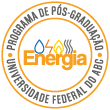Banca de QUALIFICAÇÃO: LUIZ ALBERTO PAOLIELLO ALVIM
Uma banca de QUALIFICAÇÃO de DOUTORADO foi cadastrada pelo programa.DISCENTE : LUIZ ALBERTO PAOLIELLO ALVIM
DATA : 25/11/2019
HORA: 16:00
LOCAL: sala S204, 2º andar, Bl. Alpha 2 ,Campus SBC da Fundação Universidade Federal do ABC, localizada na Al. da Universidade. s/n, B.Anchieta-S.Bernardo do Campo-SP.
TÍTULO:
Energy Efficiency in Pneumatic Conveyance of Solid Materials using Factorial Design
PÁGINAS: 40
GRANDE ÁREA: Outra
ÁREA: Multidisciplinar
RESUMO:
The use of transport of raw materials and products in their production stages are usually necessary in industrial segments, which is done through mechanical way by using, among others, air as a transport fluid. As it is used in almost all sectors of the industry in most different steps of the process, its use represents a significant part of the electrical power consumption and, therefore, the study as of the energy efficiency of its use is of utmost importance. The main objective of this work is to obtain a mathematical relationship between the quantity of pneumatically transported material and the energy used for this purpose, considering variations in the parameters of the processes. To this end, it is part of this study, the development of a prototype, which allows the use of air in the transport of solid material, instrumented so as to be able to obtain data of electricity consumption, pressure, flow rate, flow velocity, among others, that associated with the characterization of the material (granulometry and particles density) as well as the characteristics of the pneumatic transport regime (diluted phase), allows a relevant contribution in the advance of knowledge boundary in relation to the study of energy efficiency in the use of pneumatic conveyor. Besides on that, based on the previous definition of the quantities to be studied (e.g., pressure and flow), it is possible through the application of factorial design, the experimental optimization, through the simultaneous evaluation of the effect of these variables from a reduced number of experiments.
MEMBROS DA BANCA:
Presidente - Interno ao Programa - 1632464 - DOUGLAS ALVES CASSIANO
Membro Titular - Examinador(a) Interno ao Programa - 1746153 - FERNANDO GASI
Membro Titular - Examinador(a) Externo à Instituição - LOURIVAL PEREIRA MARTINS - UNIAN-SP
Membro Suplente - Examinador(a) Interno ao Programa - 2605733 - SERGIO RICARDO LOURENCO
Membro Suplente - Examinador(a) Externo ao Programa - 2526701 - JULIO FRANCISCO BLUMETTI FACO




